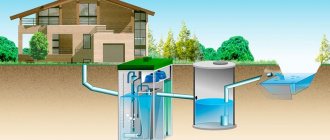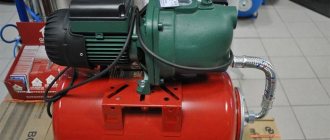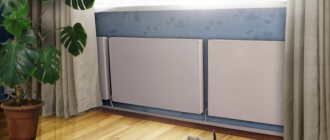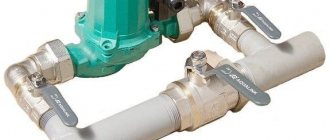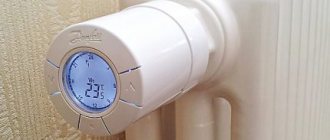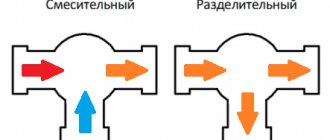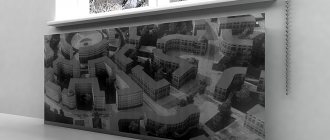Electric boiler for heating a private house
not used that often. But this is easy to explain by the cost of electricity. But despite this, they have many advantages. And in some situations, installing an electric boiler can be completely justified and very profitable.
An electric boiler uses electricity to produce heat, and they can be very effective at heating a home or supplying water to a home. Electric boilers for private homes are more efficient than boilers running on natural gas because no exhaust gas is produced.
When gases are burned, some waste gas is produced and must be vented outside the home. Along with the exhaust gases that are released, part of the heat generated by the boiler evaporates. This is a waste of precious energy.
Since electric boilers do not create flue gases, there is no chimney and almost all the heat is used to heat the house. This allows the energy efficiency of electric boilers to be increased to 99%, which is not possible with most fossil fuel solutions.
How does an electric boiler work for heating a private home?
An electric boiler is a large water tank with an inlet and an outlet. This tank contains electric heating elements.
Electricity comes from your home's main power supply and passes through these heating elements, heating them to very high temperatures. Electrical elements become hot. Water passes over them and is heated by the physical process of transferring thermal energy from a hotter body to a cooler one.
When the water reaches a high enough temperature, an electric pump moves water from the boiler through the outlet into the heating system to force coolant through the radiators. Cold water enters the electric boiler, giving off heat, and is heated by the boiler before being sent again to a new circle.
Installation of heating with an electric boiler
Installing heating with our energy-saving electric boiler is very simple, but if necessary, if you install the heating boiler yourself, we are ready to help and advise you. Our company provides a large guarantee for an electric (electrode) boiler for a period of 10 years (the service life of the boiler is 30 years), so we are interested in you being satisfied with the operation of the electric boiler. We also carry out heating installation; our specialists carry out any work regardless of the level of complexity. We will provide a free estimate for installation work and the necessary components for your heated premises. You can view the prices for installation work and see photographs of the installation of an electric heating boiler and heating systems at the following link: Installation, our work.
Will an electric boiler really be useful?
In modern conditions, gas is not accessible to everyone. Some settlements are located far from the main highway. And at times, purchasing and installing a gas boiler makes no sense at all.
For example, for a country house, which is not used very often, it is not advisable to use expensive gas equipment. And boilers that use solid fuel have many disadvantages. For example:
- Most of these units cannot operate on one load for more than five hours;
- There is no way to control the heating temperature;
- Fuel must be prepared ahead of time and in large quantities.
If you take all this into account, then an electric boiler for a private home will indeed become a good and more reliable option.
The main advantages of an electric boiler:
Electric boilers take up less space. Electric boilers can be installed anywhere you like because they don't have a chimney that needs to be routed through your home. There is no mandatory condition to install an electric boiler for heating a private house near an external wall.
An electric boiler for heating a private house can be located in the center of the cottage or in any other place that you really like. An electric boiler does not require a fuel tank, like oil or propane units. This means you save space that would normally be devoted to fuel.
Advantages of an electric boiler:
- High degree of automation;
- It does not require a separate room;
- It is possible to control the heating temperature;
- Easy and fairly quick installation, simple connection and maintenance;
- Can be mounted even on the wall, without outside help;
- Doesn't make noise;
- There is no need to connect it to the chimney.
Electric boilers are safer than gas boilers. You won't have to worry about gas leaks in your home when you rely on an electric boiler. For this reason, these devices are completely safe and can be placed outside your home. They are not that difficult to install. You will feel safe as the heating system will provide the necessary amount of heat without causing any problems.
Cons of electric boilers
While electric boilers have quite a few advantages, there are some disadvantages to using these hydronic heating systems in your home. Electric boilers can potentially cost more than gas boilers. An electric boiler also limits the amount of hot water it can produce. And most importantly, electric boilers leave you at the mercy of the power companies in the event of a power failure.
- If the boiler power is over nine kilowatts, keep in mind that they are produced only for a three-phase voltage of 380 watts;
- A separate cable is required to connect to the meter;
- You have to pay more than usual due to the high electricity tariffs.
Electricity is simply more expensive than gas in most regions of Russia. This means that by relying on electricity to heat your water and home, you'll end up spending more money. Even if your device consumes electricity more efficiently than a gas boiler. In most cases, the financial costs are higher to generate the same amount of heat.
Types of electric heating boilers
The division of electric boilers into types is based on one of three parameters.
- The number of circuits , on which the capabilities of the heating equipment depend. On this basis, all boilers are divided into single-circuit and double-circuit .
- Depending on the method of fixation, heat generators can be wall-mounted or floor-mounted .
- Electric hot water boilers are also divided into 3 types according to the type of heating element : heating element, electrode, induction.
Single-circuit and double-circuit electric boiler
Single-circuit devices can be used only for heating, or you will need to purchase an additional boiler, the volume of which depends on the needs for hot water, and connect it to the boiler. The heated coolant will flow into the boiler and heat the water for hot water supply.
Double-circuit equipment is intended not only for heating rooms, but also for hot water supply to the house. The last function is often a priority.
The second type takes up less space and is universal, as it solves two problems at once and does not require the purchase of additional equipment. But if it breaks, you will most likely immediately lose both heating and hot water supply.
Wall and floor boilers
The first option appeared relatively recently, but is very popular due to certain advantages:
- compactness;
- equipped with modern equipment;
- simple maintenance and installation.
But wall-mounted models have a shorter service life and lower productivity than floor-standing boilers. The latter are suitable for heating large rooms, more reliable, but take up much more space.
Heating boilers
These devices have a special heating tube (TEN). Such equipment operates in flow mode and has several advantages:
- relatively low price;
- successful design;
- ease of installation;
- easy adjustment according to the required room temperature thanks to special sensors;
- ability to work with different environments.
When in contact with water, limescale deposits form on heating elements, which impairs heating efficiency. This is a disadvantage of heating element electric boilers.
Such a generator is suitable for houses with soft water, as well as where non-freezing liquid will be used as a coolant, for example, when the house is not permanently inhabited.
Electrode boilers
In them, the electrode transmits electricity to the water, which heats up due to its own resistance as the electric current moves through it. Scale does not form on such heating elements. This is an advantage of electrode boilers along with other properties:
- compactness;
- safety in case of water leakage;
- gradual increase in power;
- relatively low cost.
The disadvantages of the system include:
- impossibility of using antifreeze as a coolant;
- the need to prepare water in order to achieve a certain specific resistance of the liquid;
- maintaining water circulation in the system, otherwise either the water will boil or the device will not start;
- the need to periodically replace electrodes due to their dissolution.
The latter factor is also associated with a gradual decrease in heating efficiency. Due to so many disadvantages, these boilers are not very popular.
How to install an air conditioner and split system in an apartment yourself? Detailed instructions.
We assemble an air dehumidifier with our own hands: diagram and principle of operation.
If the air in your child's room is too dry, should you buy a baby humidifier?
Induction heating boiler - the most economical electric boiler
This equipment operates on the principle of electromagnetic induction. In a simplified way, the design of an induction boiler can be described as follows:
- the coil winding is located in a sealed space between two pipes;
- the inner pipe is a core that increases the heating efficiency of the coolant;
- another pipe is put on the outside of the coil;
- this entire structure is located in the housing.
Current is supplied to the coil. As a result, an electromagnetic field arises, which heats the core and the pipe around the winding. The coolant, for example water, enters the housing, is first heated by the outer pipe, and then, thanks to convection, enters the inner core pipe through the upper hole.
There is no heating element in such a system. Therefore, there is no reduction in efficiency due to scale formation or dissolution, as happens with heating elements and electrodes. Lime deposits form in minimal quantities. But there are other positive qualities:
- high electrical safety;
- possibility of using any coolant;
- absence of detachable contacts between elements, therefore eliminating the possibility of leakage.
But induction boilers take up more space and are quite expensive.
If space and finances allow, then it is very profitable to choose this type of heating device.
Watch the video on how to choose the right electric boiler:
Having chosen the type of boiler, before purchasing it, it is also necessary to correctly calculate its power.
Types of electric boilers
Electric boilers vary in how they convert electricity into heat. The essence of their performance can be based on both direct and indirect heating. By the way, physical and chemical processes are involved in it.
Electric boilers for private homes are induction, heating element and electrode. In the first case, heating element type heaters are built into the electric boiler. In the second, as the name implies, electromagnetic induction is used to heat the liquid. The latter work using electrolysis.
The structure and size of boilers, along with the nuances of maintenance, depend on the type and model. Therefore, before choosing one or another type of electric boiler for heating a private home, it is important to understand the details and take a closer look at the strengths and weaknesses.
Induction boilers
These electric boilers for your own home work thanks to eddy currents that warm the core. An inductive coil is placed in the housing. It also houses the core. Under the influence of current, a magnetic field is formed in the environment of the coil, which creates eddy currents.
Such heaters have been used in the industrial sector for a long time. There they operate at a frequency of approximately 50 Hz. As for domestic boilers, they operate at a frequency of ten to one hundred megahertz. And due to this they are completely silent. The induction electric boiler produces slight vibration, but due to the high frequency the vibration is not felt. By the way, it also protects equipment from scale, preventing particles from settling on heating parts.
The strengths of such boilers:
- The owner can easily install and connect the electric boiler without outside help;
- Long service life without the need for repairs;
- Due to the absence of detachable connections, leaks are completely eliminated;
- You can heat not only water, but also any other liquid;
- Small sizes;
- Self-defense against scale.
Equipment weaknesses:
- The inductor has the potential to become the main source of unwanted magnetic radiation. So it would be better not to neglect the choice of the manufacturing company;
- With similar power, such electric boilers are significantly more expensive than heating boilers.
According to the manufacturers themselves, such boilers are more economical. Compared to heating elements. However, practice says that with the same power level, their output is also approximately the same. They are economical if we only talk about the duration of use.
If you have a strong desire and certain skills, you can make such an electric boiler manually. It will be much more budget-friendly, and in terms of power they are not at all inferior to purchased ones. Although in terms of aesthetics, homemade boilers are inferior to purchased ones.
Types of electric heating boilers, pros and cons of their use
There are three main types of electric boilers. They differ in the heating method.
Induction
Recognized as the most modern version of electric boilers. The work occurs thanks to an inductor made of ferromagnetic alloys, which heats the coolant. In this case, the coil does not contact directly with it, but passes along the perimeter of the unit.
Photo 1. Electric induction boiler connected to the heating system. The device is very compact in size.
This type of boiler does not have an electrode or heating element, which has a positive effect on its efficiency. The coolant is not only water, but any liquid. Other advantages of the boiler include:
- There is practically no scale formation.
- The likelihood of leaks and breakdowns is minimized.
- Economical in energy consumption.
There are disadvantages:
- The price is significantly higher than other types of electric boilers.
- Massive body dimensions.
Electrode
The heat exchanger is an electrode connected to the coolant. It is the electrode that heats the water by coming into direct contact with it.
This element transfers an electrical charge to the water, which heats up as a result of self-resistance. In this case, water molecules are decomposed into ions.
Advantages of electrode boilers:
- Safety.
- Ergonomics.
- Gradual transition to main power.
- Affordability.
- Electricity consumption is lower than in heating element boilers.
Among the disadvantages:
- The electrodes are changed periodically, as they dissolve over time.
- The coolant is exclusively water.
- Constant monitoring of optimal water circulation.
- Efficiency decreases as the electrodes burn out.
heating elements new
This type of boiler belongs to the first group, the full name is thermoelectric heater. The principle of operation is similar to the operation of a regular kettle - water is heated by a heat exchanger, heat enters the room, and natural circulation is ensured. Tubular heating elements - heating elements - act as an element for heating water. The coolant temperature is maintained automatically.
Among the advantages of this device are:
- Presentable appearance, small dimensions.
- Simplified equipment installation process.
- Average price category.
- The ability to regulate power consumption by turning on and off certain heating elements.
- The coolant is any non-freezing liquid.
However, there is a big disadvantage - scale accumulates on heating elements over time, which leads to a decrease in heat transfer and higher electricity consumption.
Heating electric boilers
Production leaders] EVAN[/anchor] and Teplotech. The popularity for the most part is based on the simple structure, which results in the affordable price of the equipment.
Heaters - heating elements are built into the tank. You can start either all or a certain amount, depending on what temperature is selected. The heaters themselves are a spiral with a fairly high resistivity. This part is housed in a ceramic tube.
During the heating process, it gives off its heat to the ceramics. And it already heats the water entering the tank. Additionally, the electric boiler has a special control panel where you can determine the temperature regime. Modern models have sensors that “monitor” the operation of the boiler and turn it off if a dangerous situation suddenly arises.
What are the advantages of such electric boilers:
- Dual-circuit models allow the connection of a hot water supply circuit;
- Can be used to heat not only water, but also any other liquid;
- The simplicity of the design makes it possible to carry out simple repairs even if the boiler owner is not a professional in this matter;
- Very budget-friendly in terms of acquisition;
- Good power coverage.
If the volumes of water used are really impressive, then it would be more advisable to install a boiler for these purposes. Because, in some models, when boiling water is turned on, the heating of water for heating is slowed down.
Weaknesses:
- The dimensions of such boilers are quite large;
- Scale forms on the heating elements, which is why the performance of the boiler decreases over time.
Rating of the best models of electric boilers for the home
Protherm Scat RAY 12 KE/14
This product is distinguished by a very high efficiency factor - this figure for the boiler reaches 99.5%, and both water and antifreeze can be used as a coolant. The design is absolutely safe due to the use of a large number of the latest and original solutions: a thermal fuse is installed, frost protection is provided, and the pump is protected from overheating and from idling. In general, the brand of these boilers has long proven itself to be successful among Russian consumers. The model is available in eight modifications, differing from each other in power ratings - from 6 to 28 kW. The boiler has a storage boiler. Despite the fact that it belongs to a single-circuit product, it is possible to heat a certain amount of water in it. It is possible to connect a room regulator, after which the system will automatically maintain the most comfortable temperature at home.
The case has a liquid crystal display and a very informative display. The controls are intuitive, so you can figure it out quickly enough. The boiler does not need to be connected to a chimney; it operates from a standard household electrical outlet. Maintenance does not require special skills. The product is very reliable, as it has a self-diagnosis system and a large number of sensors that check the performance of all equipment elements. The boiler has a circulation pump and an expansion tank, so there is no need to install them outside the device.
Advantages:
- Works absolutely silently;
- All parameters are supported stably;
- High efficiency;
- Long service life;
- Reliability;
- Occupies a minimum amount of free space;
- There is an informative display.
Flaws:
- The thermostat is not included and will have to be purchased separately.
9. Vaillant eloBLOCK VE 9
This equipment is perfect for making an individual heating system in a private home. The boiler has high power, thanks to which the room warms up to the set temperature within just a few hours. It can be used not only for residential, but also for industrial premises, the area of which is no more than 120 square meters.
If necessary, it can be connected to a heating system of the “warm floor” type; it is possible to connect a storage boiler. The body is made of thin sheet stainless steel. On its front side there is a convenient and extremely clear external control panel, equipped with an LED display, where you can easily adjust the temperature. The design includes a powerful and efficient microprocessor that ensures the accuracy of all changes in the heating system.
More: Review of the Swiss-made B.Well WI-922 stationary irrigator
To extend the service life of the unit, the manufacturer equipped it with a number of protective systems - protection from overheating, from too high pressure in the system, from freezing, etc. The power changes smoothly, which prevents overloads. The kit includes an external temperature sensor that will transmit data to the microprocessor. This, in turn, will increase or decrease the temperature of the coolant.
Advantages:
- Significant heating area;
- Possibility of connection to the “warm floor” system;
- You can additionally purchase a hot water boiler;
- The expansion tank is equipped with a mechanical pressure gauge;
- Operates exclusively on 200 V.
Flaws:
- Expensive service;
- High price.
EVAN Next 5
It can be used for heating not only private houses, but also summer cottages, warehouses and even small commercial premises. Often, some people purchase such products as a backup heat source if a solid fuel or gas appliance is installed as the main one. By and large, such a boiler is a monoblock, where control elements and all the necessary automation are located under one body, including an expansion tank and a circulation pump. There is a built-in thermostat, due to which the temperature of the coolant can range from 30 to 85 degrees. Three-stage equipment power control. In order to ensure maximum safety when heating the coolant to a set temperature, the thermostat turns off the power to the device, and when the temperature drops below the set limit, it will restart the device.
In order to further protect the device from overheating, it has a built-in emergency thermal switch of a self-resetting type. It is triggered when the temperature in the system rises to 92 degrees. The heating element is made of stainless steel, which significantly extends its service life. The design of the heating element is block-based, so if necessary, this part is very easy to replace. If desired, the boiler can be connected to a water heated floor system, and a unit can be installed that provides remote control of this device.
Advantages:
- Acceptable cost of the unit;
- Very high quality of components and assembly;
- It is possible to install additional elements;
- Automation works instantly;
- Can be connected to a heated floor system.
Flaws:
- The case is quite dirty - fingerprints and dust are visible on it.
EVAN EPO 4
This domestic product is one of the most budget models presented in our rating of the best electric boilers. The main distinguishing feature of the unit is the absence of a housing, but at the same time it retains all the basic qualities and functions. The temperature range is from 30 to 85 degrees - which is quite enough even for the most severe climatic conditions. If necessary, you can connect an external thermostat with a remote control module to the device, but you will have to purchase it separately.
The thermostat is automatic - it is activated when the coolant temperature drops below the set value. There is an overheat protection system: the boiler will turn off when the water warms up to 92 degrees. The heating element is made of thick-walled stainless steel, characterized by a long service life. The device weighs only 15 kg, the maximum pressure in the system is about 4.5 bar, and is designed for connection to a single-phase line with a voltage of 220 V.
Advantages:
- Reliable stainless steel heating elements;
- Does not require maintenance during the entire service life;
- Simple device;
- Low price.
Flaws:
- The need to purchase additional devices such as a thermostat;
- Lack of housing.
RusNIT 209M
Medium power equipment - consumes only about 9 kW, takes up little space, and is mounted on the wall. The boiler can be used both for heating and for a hot water supply system due to the additional installation of a boiler. When installing heating equipment, you will have to install an expansion tank and a circulation pump, since these elements are missing in the boiler.
There is a reliable and durable automatic system that allows you to maintain a comfortable temperature in the room - no more than 30 degrees. The temperature sensor can be placed either close to the installation or at a distance of up to 10 meters from it. There is a stepwise power adjustment - 30, 60 and 100%. The heating element and heat exchanger are made of high-quality stainless steel; water or antifreeze can be used as a coolant. Communication of heating elements is carried out using semiconductor structures, which increases the life of the device and allows it to operate completely silently. When turned on, the contacts do not burn and no interference occurs. The boiler is absolutely safe; it has several sensors that monitor the condition of the main systems.
More: TOP 10 best vacuum cleaners for home without a dust bag
Advantages:
- Perfectly withstands low voltage – up to 20%;
- The kit includes a temperature control sensor;
- The control is located on remote elements;
- Functions without failures;
- Heated area up to 65 square meters;
- Pleasant appearance and small overall dimensions;
- Connects to both single-phase and three-phase networks;
- The pump can operate in both automatic and forced mode.
Flaws:
- The magnetic starter hums a little, the issue can be solved by configuring the device;
- Difficult to connect due to confusing phase, neutral and ground locations.
ZOTA 9 Lux
The boiler is designed quite simply, which makes it easier to install and connect, and even when installing a heated floor system, you will not have to install additional control valves. The unit weighs little and has small overall dimensions, easy access to the heating elements, making boiler maintenance much easier. The boiler has convenient connecting connectors for all electronic units.
The device is equipped with a large number of fairly accurate sensors; if necessary, you can connect a weekly thermostat to use the equipment in fully automatic mode. It has a self-diagnosis system and internal memory for individual settings. In such boilers, you can use a GSM module, due to which all basic operations will be carried out from a mobile phone. The boiler is very reliable; all heating elements are made from stainless steel tubes with a diameter of 7.4 mm.
Advantages:
- Availability of a reliable overheating protection system;
- The kit includes a room thermostat;
- Small dimensions;
- Easy to install.
Flaws:
- It makes a little noise during operation;
- The design does not include an expansion tank or circulation pump.
ZOTA 12 Economy
Allows you to provide sufficient heat to residential and industrial premises, the area of which does not exceed 480 square meters. m. These products are suitable for systems with natural and forced circulation of coolant. The boiler is single-circuit and is not designed to supply hot water to the water supply system. It takes up the minimum amount of free space in the room. The heating elements are made using original technology; they are made from stainless steel tubes and can withstand any thermal load well. The boiler and the device control unit are housed in different housings. The control panel can operate both on power relays (they operate absolutely silently) and on magnetic starters, depending on the model modification of the device. In addition, the products are available in different power options - from 3 to 15 kW.
A sensor can be built into the control panel of the device, providing automatic adjustment of the air temperature in the room within the range from +10 to +35 degrees. The coolant temperature at the boiler outlet is in the range from +40 to +90. There are also automatically switched power levels, due to which the consumed electricity is consumed more economically. The boiler is equipped with a system for automatic diagnostics and rotation of heating and power elements.
Advantages:
- Suitable for absolutely any heating systems;
- Stylish appearance;
- Long service life;
- High quality components;
- Convenient and simple controls;
- Reliability and efficiency of the device.
Flaws:
- When the pressure in a forced-type system decreases, it begins to hum a little.
Reco 6P
Designed to create comfortable living conditions in industrial and residential premises, the area of which does not exceed 60 square meters. m. The products are absolutely environmentally friendly; during operation they do not emit combustion products, so the likelihood of carbon monoxide poisoning is zero. The boiler can operate from various networks - 220 and 380 V. Power adjustment is carried out both manually and automatically. The electric boiler is also characterized by an attractive and stylish appearance. This is a fairly reliable design - the expansion tank and all heating elements are made of high-quality stainless steel. The functionality has been expanded: you can program the device’s operating schedule for a whole week; it also has an energy consumption meter, so the consumer will always be aware of how much electricity this heating device has consumed.
More: TOP 10 best hand-held vacuum cleaners for home and car
Switching of heating elements here is carried out thanks to semiconductor systems, which have a significant service life, operate absolutely silently, no burning of contacts or occurrence of radio interference has been detected. Power adjustment occurs without phase imbalance. All elements function normally even at reduced voltage. The boiler can be built into a heated floor system; both water and antifreeze are used as a coolant. The product is controlled through a functional panel equipped with a liquid crystal display with all the necessary indications.
Advantages:
- Intelligent installation control system;
- The system independently collects and processes data regarding the temperature of the coolant and air in the room;
- Electricity consumption meter installed;
- Groups of heating elements can be controlled automatically.
Flaws:
- Not suitable for large areas.
Evan Warmos QX-18
It takes an honorable second place in the ranking of electric boilers. By and large, this unit is a boiler room in miniature; it is distinguished by domestic production, mechanical control, which is very easy to understand. Can be used for both residential and industrial premises; the boiler is equipped with a membrane-type expansion tank. It is designed for an area of up to 180 square meters.
The heating elements are made of stainless steel; water or antifreeze can be poured into the heating system. The device perfectly withstands voltage surges and phase imbalance. The kit includes a remote programmer that allows you to store a weekly operating cycle in the device’s memory. The boiler is absolutely safe due to the presence of a large number of different types of sensors: pressure, temperature, a protection system against short circuits and overloads in the electrical network. The unit is very economical and is equipped with light and sound alarms in case of problems.
Advantages:
- Large volume of expansion tank - 12 liters;
- Convenient access to the control panel;
- There is a built-in pump;
- Can operate on both 220 V and 380 V;
- There is an emergency warning system;
- The controls are mechanical, but all devices are electronic.
Flaws:
- It is advisable to connect through a stabilizer;
- Considerable mass;
- The capacitor is one of the most vulnerable points of the device.
EVAN EPO 6
Well suited for heating large areas, characterized by high reliability, long service life and ease of use. The device operates silently due to the original pump system and unique stainless steel housing. The unit can be used for heating country houses, so it is permissible to fill antifreeze as a coolant, large industrial premises, and so on.
The efficiency is 93% at a load of about 50% of the maximum power, the temperature is controlled smoothly, with an accuracy of a degree. You can additionally purchase a GSM-Climate module for remote control of equipment. There is a self-diagnosis system. For safe operation, the boiler is equipped with a thermostat, emergency switch and other systems.
Advantages:
- Low price and high reliability;
- Easy maintenance and installation.
Flaws:
- Not detected.
Electrode boilers
Such electric boilers for heating a private home heat water or other liquid through electrolysis. Steel electrodes are located inside the device. After connecting the current, a potential with an alternating sign is formed and thus the movement of ions occurs.
The polarity changes along with the network frequency - approximately fifty times per second. This causes the liquid to heat up quickly. In order for the entire process to take place at the desired level of intensity, a very important nuance is to maintain the electrolyte density at a stable level. The liquid acts as this electrolyte.
But do not neglect the user instructions for the newly purchased boiler. Take, for example, the rather popular model of the Galant electrode type. The instructions indicate the requirements for the liquid, which must comply with GOST 2874-82. This means that drinking water for this boiler must be endowed with a resistivity of 1.3 thousand ohms per 1 cubic centimeter.
For liquids that will be heated in a boiler of this type, preliminary preparation is necessary, as well as vigilant density control. Otherwise, the power and efficiency of the device inevitably decreases, and it may become insufficient to warm the house.
The strengths of such boilers:
- medium sizes;
- low cost;
- complete safety. If a liquid leak starts, the electric boiler will turn off and not burn out, as can happen in the case of a heating element.
Weak spots:
- The importance of constantly monitoring the density of the liquid;
- Over time, the electrodes dissolve, so they must be replaced periodically.
Power calculation
In order for electric boilers for a private home to heat it at the proper level and maintain a comfortable temperature, before you decide to purchase a boiler, it would be a good idea to calculate the power parameters.
The approximate formula is as follows: calculate the total area of the house and divide the resulting number by ten. The final result will be the lower power threshold in kilowatts. For example, the total area of the house is 95 square meters. Divide by ten, and it turns out that the approximate power of the boiler is 9.5 kilowatts.
But at the same time, it is necessary to choose an electric boiler with a little more power. For example, twelve kilowatts. However, even this level of power will not be enough for the northern regions of the country, where temperatures drop very low in winter. And therefore, auxiliary sources of heating will not be superfluous. After all, the boiler will not “plow” during the entire heating season at maximum power.
If installed correctly, it will operate in heating mode or at partial load most of the time. Therefore, it would be incorrect to calculate expenses for light based on the maximum power of the electric boiler.
Heating connection details
All types of electric boilers, and all models are equipped with fittings that are used to connect equipment to the system. The best option is a radiator system or so-called heated floors. Electricity is far from a cheap resource, and the option of heating a house from the bottom up will help reduce the temperature somewhat.
An electric boiler for heating a private home differs from those that require solid fuel. They are able to operate in systems with natural circulation. Automation, available, for example, in heating element boilers, instantly turns off the equipment if there is a threat of overheating.
We recommend using soft (boiled) water for the mentioned boilers, due to the risk of scale formation. And for electrode boilers, as mentioned earlier, all the nuances regarding the heated liquid are described in the instructions for the model.
Which electric boiler to choose for heating a private home
An electric boiler is a fairly economical way to heat an apartment or small private house. However, it will not be effective if the room is poorly insulated.
When choosing an electric boiler, pay attention to five main criteria. It depends on them how long and how effectively the device will last.
Power
It depends on the living space that needs to be heated. Special mathematical formulas have been developed to determine power.
The calculations take into account heat loss from doors and windows, the coefficient of the geographical location of the region, the presence or absence of ventilation, and the volume of the room.
However, at the everyday level it is much easier to follow a simple rule:
For an area of 10 square meters with a ceiling height of no more than three meters, the boiler power is 1 kW. If you install a double-circuit boiler, the power is almost doubled.
Attention! Experts recommend a boiler with an additional power reserve. This will be useful in cases of a sudden drop in voltage in the electrical network.
Connection method to power source
This parameter depends on the power of the device. So, a low-power boiler ( 4-6 kW ) is connected to a single-phase 220 V . The same power of the electrical network with good wiring is enough for devices up to 12 kW. with even greater power operate uninterruptedly only when connected to a three-phase network of 380 V. Some manufacturers produce boilers with two connection options at once.
Heating method
You should decide which type of device is preferable - induction, heating element or electrode. A heating element boiler is the most common option in terms of price-quality ratio. The heating element boiler comes in two types: floor-mounted and mounted (wall-mounted). However, it is not enough to heat a large two-story house.
Photo 2. Wall-mounted electric boiler connected to the heating system. An expansion tank is installed next to the device.
In this case, it is better to choose an induction boiler. It costs more, but is easier to connect to the heating system and warms up a large living area well. The electrode type of boiler is practically no different in price from the previous version, but it is more demanding in operation.
Equipment
The basic equipment costs less, but this reduces the efficiency of the boiler. In the future, it becomes necessary to purchase additional components. The complete package includes boilers:
- Circulation pump.
- Filter for fine water purification.
- Safety valve.
- Expansion tank (if the device will also be used as a boiler).
Important! Experts have calculated that purchasing a fully equipped model will cost less than gradually purchasing the missing elements.
Placement method
There are floor-standing and wall-mounted boilers. The latter type of boiler is more compact, but less powerful - on average up to 25-30 kW . Floor-standing - optimal for heating a large area, but requires additional space.
An important role is played by the presence of a boiler control system, which allows reducing waste on hot water supply and heating. The most common option is the presence of a thermostat . It turns off the power to the boiler when it reaches the set temperature.
Photo 3. Electronic thermostat for an electric boiler. Using it you can control the temperature.
They also pay attention to safety. Many modern models are equipped with protective devices that will turn off the boiler in case of overheating of the unit, sudden changes in electricity, or when water freezes.
Reference. It is a big plus if the device is equipped with two separate modes for operation in winter and summer.

